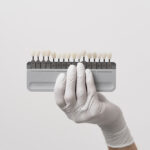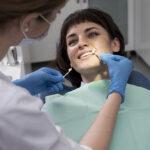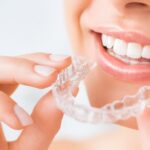How to Avoid Dental Problems with Preventative Care
Hello! Let's talk about an essential part of caring for the health of your teeth: preventive dental check-ups.
Have you ever imagined that this appointment is not just another part of your medical routine, but rather a way to prevent oral problems? The prevention consultation is like a “general check-up” of your teeth. It allows the dentist to identify and treat possible problems that do not yet hurt or are not visible, but which, if left untreated, could become more complicated and uncomfortable issues.
In this post, we'll explore how this preventive consultation plays a crucial role in maintaining your oral health. It not only helps detect incipient dental problems, but also allows you to act before they become more serious, avoiding discomfort and greater expenses in the future.
Let's discover together how this practice can make all the difference for a healthy and peaceful smile in the long term!
Understanding the Importance of Dental Check-ups
When it comes to the health of your teeth, a dental check-up is a key to keeping them strong, healthy and free from unpleasant emergencies in the long term. This consultation is not just a routine medical appointment, but a fundamental step in preventing oral problems.
By scheduling regular visits to the dentist, you allow specialized professionals to identify possible problems at an early stage, through a consultation to analyze exams and clinical conditions before they even cause pain or become visible.
This preventative practice is like a “routine check” for your mouth, helping to avoid major complications in the future and reducing tooth loss throughout your life.
Oral hygiene habits for a healthy smile
Have you ever stopped to think about how many times someone taught you in detail the correct way to brush your teeth? Sometimes, even after visits to the dentist, we may not have received detailed instructions on brushing techniques or products that are best suited to our oral health.
Dentistry has evolved significantly, but it comes from a time when prevention was not as emphasized. It's normal not to remember who or how we learned to brush our teeth, as we often absorb these habits by watching others. However, each mouth is unique, and choosing the ideal brush goes beyond a soft brush with a small head. Have you had the personalized guidance you need to ensure the best health of your teeth and gums?
Brushing your teeth is a crucial act to maintain effective oral hygiene and prevent dental problems. Understanding the correct technique can make all the difference in the health of your teeth and gums.
How should teeth be brushed
Brush Choice: Invest in a quality brush, the right size for your mouth. If possible, ask a professional dentist for detailed guidance on which would be the most suitable and effective for your tooth shape and clinical condition.
Smooth and Comprehensive Movements: Make gentle movements, at a 45-degree angle, towards the gums, using small sweeping movements. Don't forget to cover all areas of your teeth: front, back and chewing surfaces.
Appropriate frequency and timing
Twice a day: Brushing your teeth at least twice a day, preferably after main meals, helps remove food residue and bacterial plaque, but never forget to brush your teeth at night.
Night Brushing: Brushing before bed is crucial, as during sleep, saliva production decreases, creating an environment conducive to bacterial growth. Brushing your teeth before bed prevents the formation of plaque at night, simply because saliva is our greatest protection.
Never forget: brushing your tongue
Importance of Tongue Cleaning: Brushing your tongue is essential, as it is where a lot of bacteria and debris can accumulate, contributing to bad breath and bacterial growth.
Cleaning Technique: Use the back of the toothbrush or a tongue scraper to gently brush your tongue, removing debris and bacteria. This contributes to a cleaner, fresher mouth.
Remember, proper brushing isn't just about brushing your teeth, it's about adopting the correct technique, consistent frequency and including cleaning your tongue to ensure thorough cleaning and a healthier mouth.
Correct use of dental floss
Dental floss is your great ally for reaching areas where a brush cannot reach. Use it daily to remove plaque and food debris from between your teeth, helping to prevent cavities and gum problems.
Mouthwash
Mouthwash is not always necessary if you have a good grasp of brushing and flossing, as well as investing in good products. We advise this, as it is common to find patients who do not have a good brushing technique due to lack of guidance and when using the mouthwash They tend to have a false feeling of cleanliness generated by the freshness of the rinse, and if this is combined with a lack of dental check-up appointments, we will certainly be facing gingival or even periodontal problems. Leave them for exceptional cases recommended by the dentist.
Benefits of preventive visits to the Dentist
When we let dental issues accumulate, treatment can become more complex and expensive. So, how about considering preventive consultation as an investment in your oral health, avoiding not only pain, but also the need for multiple procedures at the same time?
It's worth reflecting on whether taking preventative action now would be the key to a healthy and more economical smile in the future.
Early Identification of Problems: During the check-up, the dentist Rio de Janeiro can detect small and hidden cavities, excessive tooth wear, gum problems, root canal problems without pain, and even the position of the wisdom tooth and what this could cause in the future, allowing for simpler and less invasive treatments, in addition to enabling carried out in stages and programmed.
Prevention of Future Complications: By acting in advance, it is possible to prevent small problems from evolving into more painful situations or requiring more extensive procedures. As an example, we can mention cases that start with small cavities that progress to the need to treat the tooth canal, simply because the patient only sought consultation when they were in pain.
Custom Guidance: In addition to the diagnosis, the professional can offer specific guidance for your oral health, such as appropriate brushing techniques or proper use of dental floss.
Regular dental check-ups not only contribute to the health of your teeth, but also promote peace of mind by ensuring that you are taking the necessary steps to maintain a healthy, long-lasting smile.










 per
per